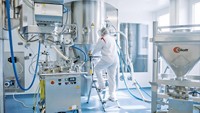Advertisement
Grab your lab coat. Let's get started
Welcome!
Welcome!
Create an account below to get 6 C&EN articles per month, receive newsletters and more - all free.
It seems this is your first time logging in online. Please enter the following information to continue.
As an ACS member you automatically get access to this site. All we need is few more details to create your reading experience.
Not you? Sign in with a different account.
Not you? Sign in with a different account.
ERROR 1
ERROR 1
ERROR 2
ERROR 2
ERROR 2
ERROR 2
ERROR 2
Password and Confirm password must match.
If you have an ACS member number, please enter it here so we can link this account to your membership. (optional)
ERROR 2
ACS values your privacy. By submitting your information, you are gaining access to C&EN and subscribing to our weekly newsletter. We use the information you provide to make your reading experience better, and we will never sell your data to third party members.
Pharmaceutical Chemicals
Sterling, Flamma acquire drug company plants
Europe’s contract sector vies for capacity as drug firms continue to exit small-molecule production
by Rick Mullin
March 2, 2022
| A version of this story appeared in
Volume 100, Issue 9

The acquisition of drug manufacturing plants by contract development and manufacturing organizations (CDMOs) continues with two recent acquisitions.
Sterling Pharma Solutions, a British firm, will acquire a former Novartis facility in Ringaskiddy, Ireland. The plant, located in the south of Ireland near Cork, includes three active pharmaceutical ingredient (API) manufacturing buildings as well as process development and scale-up labs. Sterling has agreed to maintain the workforce and continue making APIs for Novartis.
And Flamma, an Italian CDMO, will acquire a plant in Lecco, Italy, from Israel’s Teva Pharmaceutical Industries. The company is withholding further details until a presentation at an industry gathering in New York City later this month but confirms that it will retain the current staff of 65 at the site.
Kevin Cook, CEO of Sterling, says in a statement that his firm’s deal with Novartis boosts its small-molecule API production while also extending its capabilities in technologies such as peptide manufacturing and large-scale chromatography.
Flamma says its acquisition of the Teva plant supports efforts to expand capacity in Europe. “The goal is to be able to produce more APIs in Italy, which is in line with the European Pharmaceutical strategy that aims to have a more robust and resilient supply chain in the pharmaceutical sector, not totally dependent on Asia,” CEO Gian Paolo Negrisoli says in an announcement of the deal. Flamma also has a facility in China.
The acquisitions follow expansion campaigns at both companies. Sterling announced late last year that it will spend $13 million to add process development labs and commercial-scale manufacturing equipment at its site in Dudley, England. Flamma acquired a lab and pilot plant from Teva in Malvern, Pennsylvania, in 2019, and has since invested in a new research center at its headquarters.
Wayne Weiner, who heads the consulting firm PharmaTech Solutions, notes that major drug companies began rationalizing manufacturing assets 20 years ago, contributing to rapid growth in the contract services sector. The trend continues, spurred in recent years by the drug industry’s emphasis on therapeutic modalities other than small-molecule drugs, he says.
Weiner says it’s difficult to predict how long the trend will continue, though at some point, opportunities will diminish.
Roger Laforce, a consultant based in Switzerland, says European drug service companies continue to seek capacity. “Looking forward, I ask myself when will we reach a point that there will be so much capacity available again in Europe that there will be a change in the trend,” he says.




Join the conversation
Contact the reporter
Submit a Letter to the Editor for publication
Engage with us on Twitter